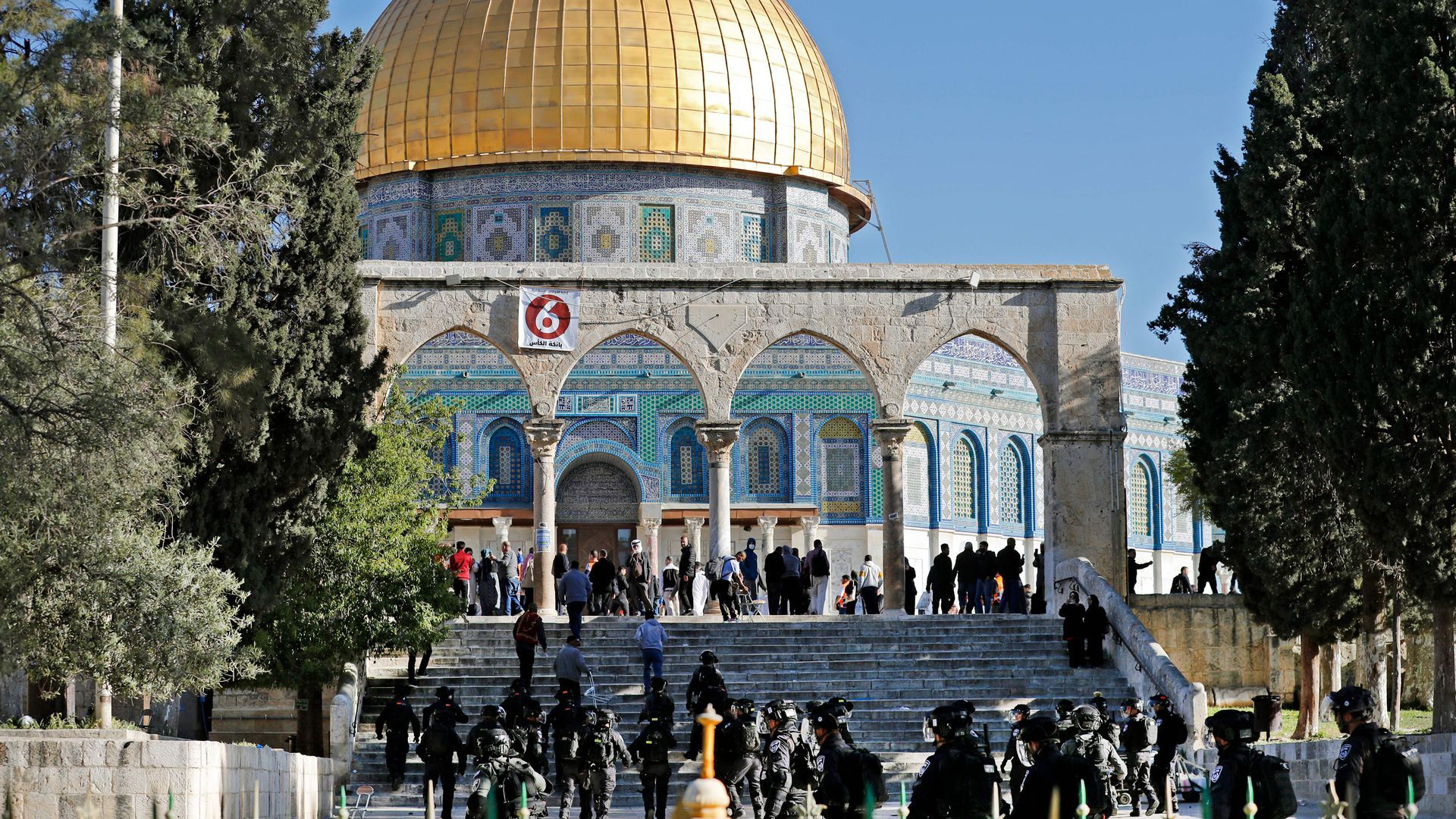Israel and Jordan to meet after Ramadan to discuss Jerusalem tensions
Add Axios as your preferred source to
see more of our stories on Google.

Israeli forces and Palestinians at the al-Aqsa compound on April 15. Photo: Ahmad Gharbli/AFP via Getty Images
Israeli and Jordanian officials are expected to meet after Ramadan to try to agree on steps that will help mitigate possible future tensions over the Temple Mount\Haram al-Sharif compound and prevent violence around the Al-Aqsa Mosque, three sources with direct knowledge of the issue told Axios.
Why it matters: Violent confrontations between Israeli police and Palestinians at the Al-Aqsa compound in Jerusalem this month threatened to spill over to the occupied West Bank and Gaza and led to a crisis between Israel and Jordan.
- The Al-Aqsa compound, which holds importance to both Muslims and Jews, is administered by Jordan.
Driving the news: Israel, Jordan, the Palestinian Authority and the Biden administration began preparing months ago to try to prevent an escalation in Jerusalem in April, when Ramadan, Passover and Easter coincided.
- But the heightened tensions boiled over into violence on April 15 in response to Palestinians throwing rocks. Scores of Palestinians were injured and hundreds were arrested. Several other raids and violent confrontations took place in the following days.
- This led Secretary of State Tony Blinken to dispatch U.S. diplomats to the region to try to calm down tensions.
Behind the scenes: Despite their efforts, there was a lot of miscommunication and lack of coordination on the ground between Israeli, Jordanian and Palestinian officials, Yael Lempert, acting assistant secretary of state for Near East Affairs, and Hady Amr, deputy assistant secretary of state, discovered in their meetings in Amman, Jerusalem and Ramallah, the sources briefed on the issue said.
- For example, there was a different understanding among the three parties about what the status quo at the Temple Mount\Haram al-Sharif compound meant.
- In 2015, then-Secretary of State John Kerry reached an understanding with then-Israeli Prime Minister Benjamin Netanyahu and Jordan's King Abdullah that Muslims can pray at the site while non-Muslims can only visit, per the status quo.
- Jordan and the Palestinian Authority felt Israel has been slowly eroding the status quo, while Israel felt it was adhering to it.
This was in part due to the rhetoric being used, the sources said. Jordanian and Palestinian officials were angered when Israeli officials said they would protect “freedom of worship," the sources said. The Jordanian and Palestinian officials said they understood this to mean that Jews could pray at the Temple Mount.
- Israeli officials, meanwhile, were angered by Jordanian officials' statements that they said falsely claimed Israel was trying to divide the compound. The Israeli officials were particularly infuriated when Jordan's Prime Minister Bisher Al-Khasawneh expressed support for Palestinians who threw rocks at Israeli police.
- Jordanian, Israeli and Palestinian officials each stressed to the U.S. envoys their domestic political problems and the pressure they get from public opinion about the holy sites in Jerusalem, the sources said.
What's next: Israel and Jordan agreed in principle to the U.S. envoys' proposal that the two sides meet after Ramadan to discuss what went wrong and how to improve the situation going forward.
- They are expected to convene a joint Israel-Jordan Jerusalem committee that will include diplomats, security officials and representatives of the Jerusalem Islamic Waqf, the endowment run by Jordan that administers the site.
- The main issue the joint committee is expected to discuss is Jordan’s request to expand the number of unarmed Waqf guards in the compound to better control the situation and prevent violence, the Israeli official said.
What to watch: Israeli officials are still cautious about saying the tensions are over, especially ahead of the last Friday prayers of Ramadan this week.
- There are also several sensitive dates next month that could escalate tensions, including Israel’s independence day and Jerusalem Day.
